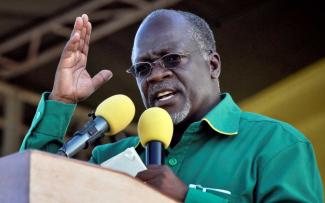Democracy
There are alternatives to fake news

There have always been lies in politics and the public domain. Why is there now talk of a “post-factual age”?
Two new aspects have emerged:
- In the case of post-factual statements, it is often unclear whether they are lies in the traditional sense. According to the philosophical definition, a lie is a statement that the speaker believes to be untrue and which he utters with the intention to deceive. In many cases, it would be more accurate to call post-factual claims “bullshit”, as defined by US philosopher Harry G. Frankfurt. They are statements in which the speakers are not interested in the truth or falsity, but rather in the emotional response and affects created. They are generally statements that are so vague or loosely worded that they are neither true nor false. Bullshit is used to achieve strategic objectives. Populist forces using “bullshit” have a propensity for using anti-establishment rhetoric. They disparage democratic institutions, attack individuals and distort democratic discourse. Their objective is to rise to power themselves.
- Moreover, people seem to value authentic communication less in recent years. Inauthentic political communication such as bullshit and lying seems to be accepted by many more people than left-leaning liberal democratic intellectuals expected. Bullshit certainly also existed in the past but I assume that neither political actors nor the general public would have accepted it as a widespread form of communication in the public domain.
Would there be a post-factual age without the internet and social media?
Probably not as we know it today. I think the internet and social media promote the spread of certain forms of inauthentic communication, such as lies, fake news and conspiracy theories. There are two reasons for that:
- Social platforms are usually not edited. Hence, the veracity of statements is frequently not checked at all.
- Digital spaces sometimes give rise to echo chambers, where people exchange views only with people who hold similar views. The phenomenon certainly predates the digital age but the internet and social media make general public opinion- and will-formation across for example ideological divides much harder. Search engines and algorithms preselect the content that is presented to users and that aligns with their preconceptions.
In the past, such fake news would not have been picked up by reputable mass media and would not have been disseminated so widely.
Why is trust in science and reputable media important?
First of all, because democratic discourse requires a common basis of factual knowledge, even if facts very rarely permit only one valid or justifiable political decision. Science and reputable media help to form that basis for democratic decisions. But they can only do so if they are trusted. If people trust science and quality media and are well informed, there are fewer opportunities for political actors to gain influence through manipulation and disinformation.
Is trust in science and reputable media decreasing?
The data I have seen shows that, in Europe at least, traditional media enjoy more public trust than online platforms or social media. However, such results always depend very much on the questions which a survey asks. What empirical evidence clearly shows is a loss of public confidence in established political elites and institutions. But recent studies suggest that people’s trust in fundamental principles of democracy is eroding too. That is even worse in my view. This indicates that people’s trust in social elites is eroding across the board. And quality media and scientific elites may also be affected.
That scepticism towards elites probably existed before the digital and post-truth age. But I think digital media amplify it and make it more visible. Much of what used to be voiced at regular get-togethers is now posted on Facebook or Twitter and reaches a much greater audience. On social media, doubts are also expressed about scientific findings and reports by quality media. In the context of the coronavirus pandemic, I had the feeling that many people were very confused by the disagreement on Covid-19 in the scientific community. To regain trust, we need to make it clear that scientific results are always provisional and must be falsifiable.
Why do people who obviously lie, like Donald Trump, enjoy popularity in some sections of the community?
For people like Donald Trump, it is crucial to discredit established political, media and scientific elites in order to gain power themselves. In doing so, I think they touch a central nerve. The man on the street sees a yawning divide between the establishment and “ordinary people”. That perception is certainly justified in some ways. Whether the gulf between citizens and elites has widened or merely become more visible, and how wide it actually is, remains to be seen. But not respecting elites has struck a popular chord.
Are democracies undermined by the abandonment of facts?
Scientifically generated facts are the basis for certain discourses. However, I would hesitate to establish too close a link between truth or facts and democracy. On the one hand, we should not forget how political actors and social elites use terms like “truth”. Our empirical analysis of German newspaper articles has shown that the term “post-faktisch” (i.e. “post-truth“) is used almost exclusively by left-leaning liberal journalists and columnists in established media to discredit anti-establishment political actors and positions. I am in no way trying to legitimise Trump or other right-wing populist actors. But appeals to “the truth” have been – and still are – very often used to disparage the views of political opponents. However, political decisions are usually based not only on facts but also on political interests and values.
Post-factual communication certainly poses a threat to democracy if it undermines fundamental trust in democratic institutions and officials and changes attitudes in favour of anti-democratic actors. But it can be counteracted if there is a free press and freedom of expression. Scientists and policymakers could also see post-factual communication as a challenge to explain scientific processes better and seek more public involvement in democratic processes.
Who finances fake news propaganda?
That very much depends on the context. Donald Trump had his Twitter account but also a financially strong lobby that very effectively disseminated his fake news and post-truth communication via traditional media. Particularly in non-democratic states, the sponsors are often regime elites, who support certain media outlets and sabotage others.
You spent some time teaching and doing research in Tanzania and Kenya. How do you assess the situation regarding press freedom and freedom of speech there?
I was in both countries during the Covid pandemic. In Tanzania, the official line under John P. J. Magufuli’s government was that there was no Covid-19. Anyone who contradicted that assertion faced reprisals or even imprisonment, depending on their nationality. Magufuli’s death – probably due to Covid – was officially explained as a case of heart failure. Under Magufuli, Tanzanians had very limited access to information about the pandemic. Samia Hassan, Magufuli’s successor, did an about-face. She acknowledged Covid’s existence and set up a committee of experts. Masks are now worn and people can basically discuss the issue in public. In that respect at least, the situation in Tanzania has improved to a certain extent. In Kenya, press freedom and freedom of speech are largely respected and protected, but homosexual rights, for example, are not. People are free to express views on homosexuality but homosexual acts are technically punishable by up to nine years in prison. These examples illustrate the difference between democratic and non-democratic states. In Tanzania, people sometimes censored themselves out of fear. They also had virtually no access to independent sources of information. In the United States and other democracies, alternative media exist and alternative views can, at least in principle, be heard.
Dannica Fleuß works as Postdoctoral Researcher at the Institute for Future Media, Democracy and Society (FuJo) at Dublin City University, Ireland, and as Research Associate at the Centre for Deliberative Democracy and Global Governance at the University of Canberra, Australia.
dannica.fleuss@dcu.ie
dannica-fleuss.com











